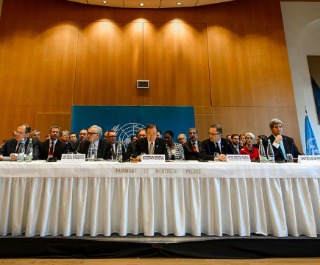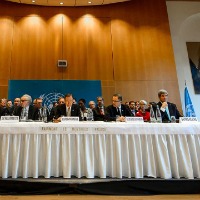
This week, Alpher discusses the Obama administration examining alternative options to the failed Geneva talks on the Syria conflict and whether there are any military or non-military US options; what are Israel's priorities regarding its approach to the fighting, even though they're not involved in efforts to end the conflict in Syria; if the Syria conflict ended tomorrow, how soon would the region revert to something approaching normalcy.
Q. The Geneva talks to resolve the Syria conflict ended in failure, with an apology to the Syrian people by UN mediator Lakhdar Brahimi. Now the Obama administration is examining alternative options. What could they be?
A. Indeed, Secretary of State John Kerry related last Friday that the president had asked his aides to "think about various options that may or may not exist". He added that such a reevaluation was taking place.>
The list of possible options for US action is long, but not particularly encouraging. And many of the options are not mutually exclusive, meaning they can be invoked simultaneously.
Q. Are there any military options?
The list presumably does not include direct US military attacks on the Assad regime, its ordnance and its Iranian and Hezbollah allies. That option appears to have been abandoned for good last fall when President Obama joined Russia in opting for an internationally-organized removal of Syria's chemical weapons and production facilities rather than attack them militarily. However rational and persuasive his reasons for avoiding military intervention anywhere in the Middle East and preferring a diplomatic approach--and the reasons are indeed rational and persuasive from an American standpoint--President Obama is now perceived in the region as a risk-averse president who is intent on restricting America's commitments and who does not back up his diplomacy with a credible military threat.
A secondary military option is to increase the flow of arms and training for moderate Syrian rebels. The US appears to be doing this, particularly on the "southern front" between Damascus and Deraa on the Jordanian border. Here Saudi Arabia is apparently working closely with the CIA inside Jordan, and inside Syria with a Supreme Military Command regional leader named Bashar al-Zoubi, who has close clan ties inside Jordan.
The Syrian rebels' southern front received another potential boost on Sunday with the appointment by the rebels' moderate civilian leaders of a new overall military commander, Abd al-Illah al-Bashir, who hails from Kuneitra on the Golan border with Israel. This apparent new emphasis on the southern front is congenial to both Israel and Jordan insofar as both fear the rise of Salafi influence among the rebels near their borders and welcome the emergence of a stronger moderate rebel presence.
A very different quasi-military option would involve working with the Assad regime's intelligence arm against a variety of al-Qaeda-related Salafi extremists inside Syria--the kind that will focus their attacks on neighboring countries like Jordan, Israel and Lebanon the moment they have the opportunity (they are already launching attacks against Shiite targets in Lebanon). Assad labels the entire opposition "terrorists", but he is apparently prepared to exchange intelligence data regarding the real extremists with interested western governments.
So far, six western intelligence services have reportedly commenced such liaison, usually because they are concerned about their own Muslim nationals who are fighting inside Syria and are feared to be potential suicide bombers once they return home. Alternatively, as in the case of Spain, the concern is for journalists who have disappeared inside Syria and may be held by the regime, as well as for the welfare of the Spanish contingent in UNIFIL in southern Lebanon. The latter could be threatened by pro-Assad Hezbollah forces if Spain is perceived to be too friendly with the rebels.
The US is apparently not engaged in intelligence liaison with the Syrians, though it once did, after 9/11. But it could easily work through friendly western services if a vital need is deemed to have arisen.
Finally, there is a quasi-military option of sorts, a kind of default option. To the extent no political or military solution appears likely--and that is currently the case--the US and other interested parties could simply continue to seek ways to "quarantine" the Syria conflict and prevent it from overflowing any further. It already has spilled over into Lebanon and Iraq; can the conflict be kept out of Jordan and Turkey until it subsides due to exhaustion, even if this takes another ten years? This might require the investment of US resources along Syria's borders, an option exacerbated by the fact that the credibility of US military commitments in the region is by now problematic.
Q. And non-military US options?
A. One is to maintain "more of the same" international diplomatic pressure for the opposing sides to meet and talk. The collapse of the latest Geneva effort and Brahimi's gloomy post-mortem render this option problematic. So does the cynical behavior of Assad's delegation in Geneva and Assad's own decision to label some of the opposition delegates there "terrorists" and confiscate their property even while the talks were going on. Moreover, revelations to the effect that Syria is cheating on its commitment to allow removal of all chemical weapons, depots and production plants can and perhaps should be understood to pull the rug out from the entire premise of the Geneva talks.
One way to inject greater relevance into the Geneva diplomatic track that is frequently mentioned is to bring Iran in as a full-fledged participant rather than a kind of backroom consultant. Iran has more influence with Assad than Russia, and professes to seek a reasonable outcome. Such a step would presumably be integrated with the international community's ongoing nuclear talks with Iran and could serve as a kind of quid pro quo for concessions there by Tehran.
But this would require Washington to water down its definition of Iran as a state sponsor of terrorism. Further, Kerry's own condemnation Sunday of the Russians and Iranians for supporting Syrian intransigence at Geneva does not bode well for the future of the diplomatic effort. Indeed, Iran has yet to prove that its interest in Syria is anything but sectarian-Shiite and possessing a platform for launching aggression against Israel.
Accordingly, acquiescing in Iran's participation at Geneva would be a very unwelcome step in Israel. Israelis would view this step as a move toward legitimization of Iran's growing presence along Israel's borders: in neighboring Syria, where it is already a dominant actor in security planning, and indirectly among Lebanon's Hezbollah as well.
Lastly, there is the option of increasing much-needed humanitarian aid. Here the challenge is to ensure that it reaches the people in need, who are usually associated with the Assad regime's enemies. The excruciating difficulty of delivering a pittance of aid to beleaguered Homs and effecting evacuation of a handful of civilians from there last week offers a painful illustration of the difficulties involved.
Q. While Israel is not involved in efforts to end the conflict in Syria, it undoubtedly has its own priorities regarding its approach to the fighting. What are they?
A. Israel is dealing with no fewer than five potential military fronts in the Syria context. There is the Israel-Jordan-southern Syria complex alluded to above; the Israel-Syria Golan front where Israeli military planners are increasingly concerned over Salafi penetration and ways to counter it even as they try to maintain Israel's ceasefire obligations with Syria; the Lebanon/Hezbollah front that is currently largely dormant due to Hezbollah's deployment inside Syria; and the naval front--the danger of terrorist rocket or suicide speedboat attack on Israel's maritime gas installations that is posed by both Hezbollah and jihadis in Lebanon and Syria.
A fifth front is more distant: in Gaza and Sinai. We have already witnessed a kind of Salafi international moving fighters between Sinai and Syria. Coordination between these two fronts could grow.
Israel's priorities begin with ensuring that the territory of Syria and Lebanon across its borders is not ruled by hostile elements, whether Iran and Hezbollah or extremist Salafis. For now, this remains an unfulfilled aspiration. Not interfering and not being perceived to take sides is another priority--one largely maintained thus far.
A third set of priorities involves coordination with outside actors, beginning with the United States but also including Russia--which shares Israel's concerns over Sunni Salafi terrorism. Closer to home, liaison with Jordan regarding southern Syria is semi-official, while Saudi Arabia shares Israel's concerns regarding Iranian and Hezbollah/Shiite influence.
Q. Suppose the Syria conflict ended tomorrow: how soon would the region revert to something approaching normalcy?
A. Even if we ignore the question of who takes over Syria or who rules its component parts if the conflict ends with Syria's effective partition, normalcy at the civilian level would probably not be achieved for a generation at least. This is because the Syria conflict has created millions of refugees, and refugees do not "go home" very quickly.
For example, only some 40 percent of the 600,000 or more Syrian refugees in Jordan would be able to return to homes in Syria. The remaining refugees have nothing to return to: one-third of the housing stock and up to 25 percent of classrooms in Syria have been destroyed, and the count grows daily. This means that neither Syria nor Jordan could return to normalcy very soon. And there are even larger numbers of Syrian refugees in Lebanon and Turkey.
This is yet another reminder that the Syria conflict is reshaping the Levant and rewriting Middle East history.
